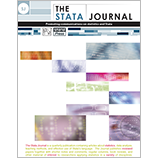A flexible parametric competing-risks model using a direct likelihood approach for the cause-specific cumulative incidence function
Sarwar Islam Mozumder
Department of Health Sciences
University of Leicester
Leicester, UK
[email protected]
|
Mark J. Rutherford
Department of Health Sciences
University of Leicester
Leicester, UK
[email protected]
|
Paul C. Lambert
Department of Health Sciences
University of Leicester
Leicester, UK
and
Medical Epidemiology and Biostatistics
Karolinska Institutet
Stockholm, Sweden
[email protected]
|
Abstract. In competing-risks analysis, the cause-specific cumulative incidence function
(CIF) is usually obtained in a modeling framework by either 1) transforming on
all cause-specific hazards or 2) transforming by using a direct relationship
with the subdistribution hazard function. We expand on current competing-risks
methodology from within the flexible parametric survival modeling framework and
focus on the second approach. This approach models all cause-specific CIFs
simultaneously and is more useful for answering prognostic-related questions.
We propose the direct flexible parametric survival modeling approach for the
cause-specific CIF. This approach models the (log cumulative) baseline hazard
without requiring numerical integration, which leads to benefits in
computational time. It is also easy to make out-of-sample predictions to
estimate more useful measures and incorporate alternative link functions, for
example, logit links. To implement these methods, we introduce a new estimation
command, stpm2cr, and demonstrate useful predictions from the model
through an illustrative melanoma dataset.
View all articles by these authors:
Sarwar Islam Mozumder, Mark J. Rutherford, Paul C. Lambert
View all articles with these keywords:
stpm2cr, survival analysis, competing risks, flexible parametric models, subdistribution hazard, cumulative incidence function
Download citation: BibTeX RIS
Download citation and abstract: BibTeX RIS
|
